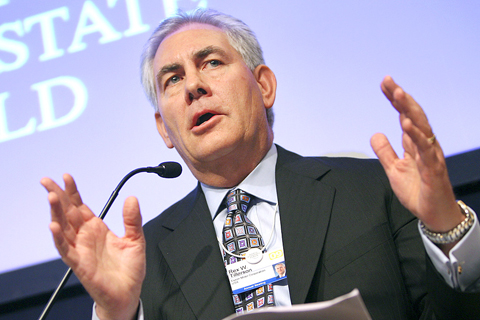Exxon Mobil on Friday notched a record US$45.22 billion profit last year despite a 33 percent income decline in the fourth quarter as the oil giant rode out high volatility in energy prices.
It was the biggest annual profit declared by any publicly listed company in the world, coming on the back of crude’s triple-digit price for most of the year, rocketing to a record peak above US$147 a barrel in July. The Irving, Texas-based company shattered its own annual profit record of US$40.6 billion posted in 2007 even as fourth-quarter income declined to US$7.82 billion.
The quarterly drop in earnings was the biggest since 2001 as oil prices collapsed at the end of last year amid financial turmoil in the US and most of the industrialized world.

PHOTO: BLOOMBERG
Its quarterly profit even then was equivalent to US$1.55 per share, beating analyst expectations of US$1.45.
Exxon, also the largest US oil producer, said capital and exploration spending rose 11 percent to US$6.8 billion in the fourth quarter, taking such expenditures for the whole year to US$26.1 billion.
“ExxonMobil’s financial strength continued to support its disciplined capital investment approach in the midst of a growing global economic slowdown,” company chairman Rex Tillerson said in a statement.
He said that weaker crude oil prices, higher operating expenses, lower chemical volumes and the impact of hurricanes that hit the US Gulf Coast in the fourth quarter were partly offset by higher downstream margins.
The company’s quarterly revenues fell 27.4 percent year-on-year to US$84.7 billion.
Cash flow from operations and asset sales between October and December was US$12.2 billion, the company said.
Exxon shares rose 1.19 percent to US$77.92.
Chevron, the second biggest US oil firm, reported on Friday that its final quarter net profit in last year rose marginally — less than 1 percent — to US$4.9 billion
The San Ramon, California-based company’s full year income rose 28 percent to US$23.93 billion.
Houston-based ConocoPhillips, the third biggest US oil company, was not so lucky, reporting earlier this week a quarterly loss of US$31.8 billion, the largest loss in its history, after writing off the value of key assets.
While top oil companies seemed to have pulled through the oil price slump so far, many expect this year to be a rough year for petroleum companies.
Anglo-Dutch energy giant Royal Dutch Shell announced on Thursday it made a net loss of US$2.81 billion in the final quarter as plunging oil prices slashed the value of inventories.
The loss compared with a net profit of US$8.47 billion during the fourth quarter of 2007 when crude prices were far higher, Europe’s largest oil company said.
Most oil companies are trimming investments and slashing costs as they face the biggest downturn in 25 years.

TECH CLUSTER: The US company’s new office is in the Shalun Smart Green Energy Science City, a new AI industry base and cybersecurity hub in southern Taiwan US chip designer Advanced Micro Devices Inc (AMD) yesterday launched an office in Tainan’s Gueiren District (歸仁), marking a significant milestone in the development of southern Taiwan’s artificial intelligence (AI) industry, the Tainan City Government said in a statement. AMD Taiwan general manager Vincent Chern (陳民皓) presided over the opening ceremony for the company’s new office at the Shalun Smart Green Energy Science City (沙崙智慧綠能科學城), a new AI industry base and cybersecurity hub in southern Taiwan. Facilities in the new office include an information processing center, and a research and development (R&D) center, the Tainan Economic Development Bureau said. The Ministry

ADVERSARIES: The new list includes 11 entities in China and one in Taiwan, which is a local branch of Chinese cloud computing firm Inspur Group The US added dozens of entities to a trade blacklist on Tuesday, the US Department of Commerce said, in part to disrupt Beijing’s artificial intelligence (AI) and advanced computing capabilities. The action affects 80 entities from countries including China, the United Arab Emirates and Iran, with the commerce department citing their “activities contrary to US national security and foreign policy.” Those added to the “entity list” are restricted from obtaining US items and technologies without government authorization. “We will not allow adversaries to exploit American technology to bolster their own militaries and threaten American lives,” US Secretary of Commerce Howard Lutnick said. The entities

Minister of Finance Chuang Tsui-yun (莊翠雲) yesterday told lawmakers that she “would not speculate,” but a “response plan” has been prepared in case Taiwan is targeted by US President Donald Trump’s reciprocal tariffs, which are to be announced on Wednesday next week. The Trump administration, including US Secretary of the Treasury Scott Bessent, has said that much of the proposed reciprocal tariffs would focus on the 15 countries that have the highest trade surpluses with the US. Bessent has referred to those countries as the “dirty 15,” but has not named them. Last year, Taiwan’s US$73.9 billion trade surplus with the US

The Taipei International Cycle Show (Taipei Cycle) yesterday opened at the Taipei Nangang Exhibition Center, with the event’s organizer expecting a steady recovery in the industry this year following a tough last year. This year, 980 companies from 35 countries are participating in the annual bicycle trade show, showcasing technological breakthroughs and market development trends of the bicycle industry at 3,600 booths, the Taiwan External Trade Development Council (TAITRA, 外貿協會) said in a statement. Under the theme “Ride the Revolution,” the exhibition has attracted more than 3,500 international buyers from 80 countries to preregister for the four-day event, which is expected to